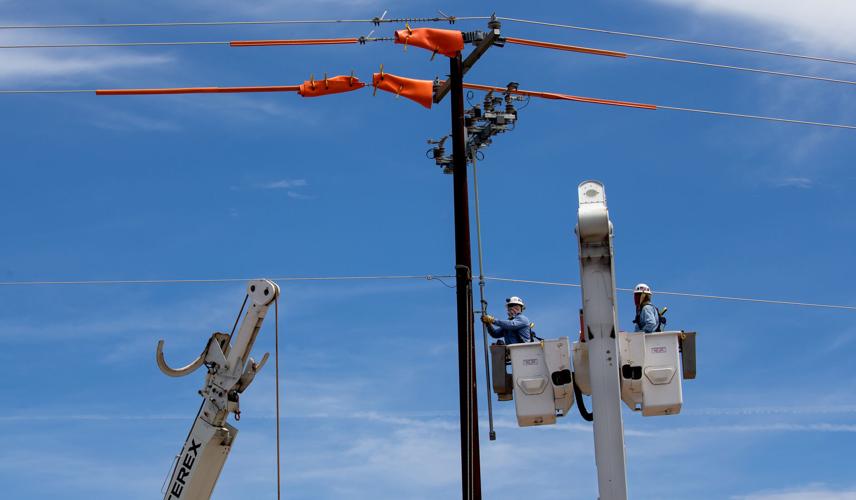As Arizona enters another sweltering summer, state regulators are finalizing rules for Tucson Electric Power and other state-regulated utilities aimed at making sure the heat isn’t lethal for residents.
The Arizona Corporation Commission in mid-April approved tentative guidelines for state-regulated utilities like Tucson Electric Power restricting service disconnections for non-payment because of extreme heat or cold that could jeopardize customers’ health and safety.
The new rules — which would replace a shutoff ban from June 1 through Oct. 15, adopted in 2019 — would let affected utilities use the current calendar period or instead suspend shutoffs when the temperature tops 95 degrees.
For now, the utilities must continue to observe the June-October shutoff moratorium, which has protected thousands of Arizona ratepayers from disconnection.
After ending its voluntarily extended shutoff moratorium in February, TEP disconnected more than 2,200 customers for non-payment in March, and Arizona Public Service Co. shut off more than 10,000 delinquent accounts in February and March, according to data filed with the ACC.
Making the rules
The draft rules, which must still go through a final rule-making process, lets TEP and other affected utilities choose one of two benchmarks at which they will suspend disconnection of customers: when the temperature tops 95 degrees or dips below 32 degrees or when the weather is deemed “especially dangerous to health”; or annually from June 1 through Oct. 15.
The rules ban shutoffs of customers who submit documentation that utility service is deemed medically necessary.
The proposed rules also impose new shutoff notice requirements, require utilities to put delinquent customers on payment plans — something already in place as part of the emergency rules — and raise the level of past-due balances that could trigger a shutoff to $300 for electric customers and $100 for gas customers.
The tentative rules would replace an emergency shutoff ban from June 1 through Oct. 15, which was adopted in June 2019 after the heat-related death of an Arizona Public Service Co. customer whose power had been turned off for nonpayment.
Last year, the ACC started the moratorium early on March 13 to help customers cope with the COVID-19 pandemic, and TEP and other utilities voluntarily extended it through the end of 2020.
The June-October shutoff moratorium will go into effect on Tuesday, June 1, and remain in place until the new rules gain final approval after a public-comment and hearing process expected to stretch into the fall.
Public input
The Corporation Commission is hosting two telephonic public-comment sessions on the new rules at 10 a.m. June 28 and July 1. To participate, call 1-866-705-2554 (the code to speak is 241497#; the code to listen only is 2414978#).
The proposed new disconnection rules will not apply to the state’s member-owned electrical cooperatives, which have typically used National Weather Service advisories as a guideline for when to suspend shutoffs. Shutoff rules for the co-ops will be governed by their current terms of service and will be reviewed in the future as part of their individual rate cases.
Separate shutoff rules for natural-gas companies such as Southwest Gas and UniSource Energy Services protect customers from disconnection when temperatures don’t top 32 degrees.
Seasonal moratorium
Both TEP and APS have historically used National Weather Service heat advisories or warnings to determine when to suspend shutoffs, and they favored that approach in the proposed new rules.
But the Corporation Commission removed that option after hearing testimony that such advisories are inconsistent and currently subject to change.
TEP spokesman Joe Barrios said as the rules are now proposed, the company will likely use the June-October shutoff moratorium, rather than the temperature-based standard, for simplicity’s sake.
“Implementing a moratorium based on the other criteria would present a challenge because we provide service in different geographic areas with different climates,” Barrios said.
Whatever happens with the new rules, TEP is committed to helping customers avoid service shutoffs when they need it most, Barrios said.
“We have consistently endorsed the principle that service should not be disconnected during periods of extreme weather for those with the inability to pay,” he said.
Shutoffs resumed
TEP disconnected 2,240 delinquent customers in March, after ending its voluntary shutoff moratorium extended to help customers cope with the pandemic.
Figures for April and May disconnections were not immediately available, Barrios said.
While TEP doesn’t closely track service reconnections, Barrios said, the company estimates that service to about half to three-quarters of those shut off for non-payment is restored within days after customers make their accounts or payment plans current.
In many cases where TEP doesn’t reconnect an account, the company finds the customer has moved, he said.
TEP reported that as of March, 22,133 customer accounts were delinquent, with arrears totaling $9.5 million.





